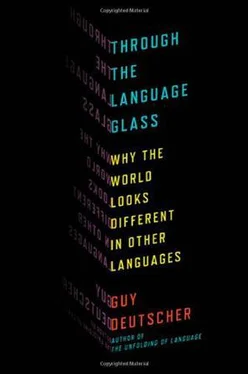
Guy Deutscher
Through the Language Glass, Why the World Looks Different in Other Languages
Copyright © 2010 by Guy Deutscher
Prologue: Language, Culture, and Thought
“There are four tongues worthy of the world’s use,” says the Talmud: “Greek for song, Latin for war, Syriac for lamentation, and Hebrew for ordinary speech.” Other authorities have been no less decided in their judgment on what different languages are good for. The Holy Roman Emperor Charles V, king of Spain, archduke of Austria, and master of several European tongues, professed to speaking “Spanish to God, Italian to women, French to men, and German to my horse.”
A nation’s language, so we are often told, reflects its culture, psyche, and modes of thought. Peoples in tropical climes are so laid-back it’s no wonder they let most of their consonants fall by the wayside. And one need only compare the mellow sounds of Portuguese with the harshness of Spanish to understand the quintessential difference between these two neighboring cultures. The grammar of some languages is simply not logical enough to express complex ideas. German, on the other hand, is an ideal vehicle for formulating the most precise philosophical profundities, as it is a particularly orderly language, which is why the Germans have such orderly minds. (But can one not hear the goose step in its gauche, humorless sounds?) Some languages don’t even have a future tense, so their speakers naturally have no grasp of the future. The Babylonians would have been hard-pressed to understand Crime and Punishment , because their language used one and the same word to describe both of these concepts. The craggy fjords are audible in the precipitous intonation of Norwegian, and you can hear the dark l ’s of Russian in Tchaikovsky’s lugubrious tunes. French is not only a Romance language but the language of romance par excellence. English is an adaptable, even promiscuous language, and Italian-ah, Italian!
Many a dinner table conversation is embellished by such vignettes, for few subjects lend themselves more readily to disquisition than the character of different languages and their speakers. And yet should these lofty observations be carried away from the conviviality of the dining room to the chill of the study, they would quickly collapse like a soufflé of airy anecdote-at best amusing and meaningless, at worst bigoted and absurd. Most foreigners cannot hear the difference between rugged Norwegian and the endless plains of Swedish. The industrious Protestant Danes have dropped more consonants onto their icy windswept soil than any indolent tropical tribe. And if Germans do have systematic minds, this is just as likely to be because their exceedingly erratic mother tongue has exhausted their brains’ capacity to cope with any further irregularity. English speakers can hold lengthy conversations about forthcoming events wholly in the present tense (I’m flying to Vancouver next week…) without any detectable loosening in their grip on the concepts of futurity. No language-not even that of the most “primitive” tribes-is inherently unsuitable for expressing the most complex ideas. Any shortcomings in a language’s ability to philosophize simply boil down to the lack of some specialized abstract vocabulary and perhaps a few syntactic constructions, but these can easily be borrowed, just as all European languages pinched their verbal philosophical tool kit from Latin, which in turn lifted it wholesale from Greek. If speakers of any tribal tongue were so minded, they could easily do the same today, and it would be eminently possible to deliberate in Zulu about the respective merits of empiricism and rationalism or to hold forth about existentialist phenomenology in West Greenlandic.
If musings on nations and languages were merely aired over aperitifs, they could be indulged as harmless, if nonsensical, diversions. But as it happens, the subject has also exercised high and learned minds throughout the ages. Philosophers of all persuasions and nationalities have lined up to proclaim that each language reflects the qualities of the nation that speaks it. In the seventeenth century, the Englishman Francis Bacon explained that one can infer “significant marks of the genius and manners of people and nations from their languages.” “Everything confirms,” agreed the Frenchman Étienne de Condillac a century later, “that each language expresses the character of the people who speak it.” His younger contemporary, the German Johann Gottfried Herder, concurred that “the intellect and the character of every nation are stamped in its language.” Industrious nations, he said, “have an abundance of moods in their verbs, while more refined nations have a large amount of nouns that have been exalted to abstract notions.” In short, “the genius of a nation is nowhere better revealed than in the physiognomy of its speech.” The American Ralph Waldo Emerson summed it all up in 1844: “We infer the spirit of the nation in great measure from the language, which is a sort of monument to which each forcible individual in a course of many hundred years has contributed a stone.”
The only problem with this impressive international unanimity is that it breaks down as soon as thinkers move on from the general principles to reflect on the particular qualities (or otherwise) of particular languages, and about what these linguistic qualities can tell about the qualities (or otherwise) of particular nations. In 1889, Emerson’s words were assigned as an essay topic to the seventeen-year-old Bertrand Russell, when he was at a crammer in London preparing for the scholarship entrance exam to Trinity College, Cambridge. Russell responded with these pearls: “We may study the character of a people by the ideas which its language best expresses. French, for instance, contains such words as ‘spirituel,’ or ‘l’esprit,’ which in English can scarcely be expressed at all; whence we naturally draw the inference, which may be confirmed by actual observation, that the French have more ‘esprit,’ and are more ‘spirituel’ than the English.”
Cicero, on the other hand, drew exactly the opposite inference from the lack of a word in a language. In his De oratore of 55 BC, he embarked on a lengthy sermon about the lack of a Greek equivalent for the Latin word ineptus (meaning “impertinent” or “tactless”). Russell would have concluded that the Greeks had such impeccable manners that they simply did not need a word to describe a nonexistent flaw. Not so Cicero: for him, the absence of the word was a proof that the fault was so widespread among the Greeks that they didn’t even notice it.
The language of the Romans was itself not always immune to censure. Some twelve centuries after Cicero, Dante Alighieri surveyed the dialects of Italy in his De vulgari eloquentia and declared that “what the Romans speak is not so much a vernacular as a vile jargon… and this should come as no surprise, for they also stand out among all Italians for the ugliness of their manners and their outward appearance.”
No one would dream of entertaining such sentiments about the French language, which is not only romantic and spirituel but also, of course, the paragon of logic and clarity. We have this on no lesser authority than the French themselves. In 1894, the distinguished critic Ferdinand Brunetière informed the members of the Académie française, on the occasion of his election to this illustrious institution, that French was “the most logical, the clearest, and the most transparent language that has ever been spoken by man.
Читать дальше












